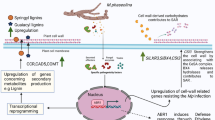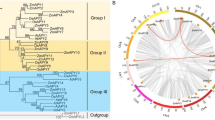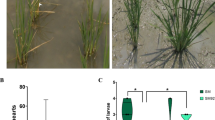Abstract
The WRKY family is a large group of transcription factors found in higher plants; it plays an important role in many aspects of biological processes. However, there is very little information about this family in melon (Cucumis melo L.). In our research, 57 candidate WRKY genes in the melon genome were identified. According to their structural and phylogenetic features, the 57 CmWRKY genes were classified into three groups, I, II, and III, and the group II was further divided into five subgroups. Group I included 11 members that all have two conservative WRKY domains and a C2H2-type zinc finger motif; Group II contains 41 WRKY gene family members, that all have a WRKY domain and a C2H2-type zinc finger motif. Five members that all have a conservative WRKY domain and a C2HC-type zinc finger motif are classified as Group III. The expression of 16 selected melon WRKY genes was detected by quantitative real-time PCR after sprayed with salicylic acid (SA) or powdery mildew infection. qRT-PCR analysis showed that 16 CmWRKY genes exhibited distinct expression patterns upon powdery mildew infection, and the expression levels of nine genes were inhibited, and seven genes were induced. After being sprayed with SA, the expression levels of 11 genes were inhibited, and five genes were induced. The data here provide an important basis for further functional studies of the WRKY gene in melon resistance.






Similar content being viewed by others
References
Bi CW, Xu YQ, Ye QL, Yin TM, Ye N (2016) Genome-wide identification and characterization of WRKY gene family in Salix suchowensis. Peer J 4:e2437–e2348. https://pubmed.ncbi.nlm.nih.gov/27651997/
Casulli F, Santomauro A, Faretra F (2008) Natural compounds in the control of powdery mildew on Cucurbitaceae. Bull OEPP 30: 209–212. https://onlinelibrary.wiley.com/doi/abs/https://doi.org/10.1111/j.1365-2338.2000.tb00881.x
Chen CH, Chen ZX (2002) Potentiation of developmentally regulated plant defense response by AtWRKY18, a pathogen-induced arabidopsis transcription factor. Plant Physiol 129(2): 706–16. https://pubmed.ncbi.nlm.nih.gov/12068113/
Chen CH, Chen XQ, Han J, Lu WL, Ren ZH (2020) Genome-wide analysis of the WRKY gene family in the cucumber genome and transcriptome-wide identification of WRKY transcription factors that respond to biotic and abiotic stresses. BMC Plant Biology 20:443. https://bmcplantbiol.biomedcentral.com/articles/https://doi.org/10.1186/s12870-020-02625-8
Cheng Y, Ahammed GJ, Yu J, Yao Z, Ruan M,Ye Q, Li Z, Wang R, Feng K, Zhou G, Yang Y, Diao W, Wan H (2016) Putative WRKYs associated with regulation of fruit ripening revealed by detailed expression analysis of the WRKY gene family in pepper. Sci Rep 6(1) 39000. https://pubmed.ncbi.nlm.nih.gov/27991526/
Ding MQ, Chen JD, Jiang YR, Lin LF, Cao YF, Wang MH, Zhang YT, Rong JK, Ye WW (2015) Genome-wide investigation and transcriptome analysis of the WRKY gene family in Gossypium. Mol Genet Genomics 290: 151–171. https://pubmed.ncbi.nlm.nih.gov/25190108/
Eulgem T, Rushton PJ, Robatzek S, Somssich IE (2000) The WRKY superfamily of plant transcription factors. Trends Plant Sci 5(5): 199–206. https://pubmed.ncbi.nlm.nih.gov/10785665/
Fukino N, Ohara T, Monforte AJ, Sugiyama M,Sakata Y, Kunihisa M, Matsumoto S (2008) Identification of QTLs for resistance to powdery mildew and SSR markers diagnostic for powdery mildew resistance genes in melon (Cucumis melo L.). Theor Appl Genet 118: 165–175. https://pubmed.ncbi.nlm.nih.gov/18797839/
García-Gutiérrez L, Zeriouh H, Romero D, Cubero J, Vicente A, Pérez-García A (2013) The antagonistic strain Bacillus subtilis UMAF6639 also confers protection to melon plants against cucurbit powdery mildew by activation of jasmonate-and salicylic acid-dependent defence responses. Microb Biotechnol 6(3): 264–274. https://www.ncbi.nlm.nih.gov/pmc/articles/PMC3815921/
Garcia-Mas J, Benjak A, Sanseverino W, Bourgeois M, Mir G, González VM, Hénaff E, Câmara F, Cozzuto L, Lowy E, Alioto T, Capella-Gutiérrez S, Blanca J, Cañizares J, Ziarsolo P, Gonzalez-Ibeas D, Rodríguez-Moreno L, Droege M, Du L, Alvarez-Tejado M, Lorente-Galdos B, Melé M, Yang L, Weng Y, Navarro A, Marques-Bonet T, Aranda MA, Nuez F, Picó B, Gabaldón T, Roma G, Guigó R, Casacuberta JM, Arús P, Puigdomènech P (2012) The genome of melon (Cucumis melo L.). Proc Natl Acad Sci USA 109(29): 11872–11877. https://pubmed.ncbi.nlm.nih.gov/22753475/
Guo PR, Li Z, Huang P, Li B, Fang S, Chu J, Guo H (2017) A tripartite amplification loop involving the transcription factor WRKY75, salicylic acid, and reactive oxygen species accelerates leaf senescence. Plant Cell 29: 2854–2870. http://www.plantcell.org/content/29/11/2854
Guo RR, Qiao H, Zhao J, Wang X, Tu M, Guo C, Wan R, Li Z, Wang X (2018) The grape VlWRKY3 gene promotes abiotic and biotic stress tolerance in transgenic Arabidopsis thaliana. Front Plant Sci 9: 545. http://europepmc.org/article/MED/29922304
Huang SX, Gao Y, Liu J, Peng X, Niu X, Fei Z, Cao S, Liu Y (2012) Genome-wide analysis of WRKY transcription factors in Solanum lycopersicum. Mol Genet Genomics 287: 495–513. https://pubmed.ncbi.nlm.nih.gov/22570076/
Hussain RMF, Verk MCV, Linthorst HJM (2012) Effects of knockout and overexpression of AtWRKY50 and AtWRKY28 in transgenic plants. Leiden University. 105–122. https://openaccess.leidenuniv.nl/bitstream/handle/1887/19963/Chapter%205.pdf?sequence=20
Ishiguro S, Nakamura K (1994) Characterization of a cDNA encoding a novel DNA-binding protein, SPF1, that recognizes SP8 sequences in the 5′ upstream regions of genes coding for sporamin and β-amylase from sweet potato. Mol Gen Genet 244(6): 563–571. https://pubmed.ncbi.nlm.nih.gov/7969025/
Jiao ZG, Jiao ZG, Sun JL, Wang CQ, Dong YM, Xiao SH, XL, Cao QW, Li LB, Li WD, Gao C, (2018) Genome-wide characterization, evolutionary analysis of WRKY genes in Cucurbitaceae species and assessment of its roles in resisting to powdery mildew disease. PLoS ONE 13(12): e0199851. https://www.biorxiv.org/content/https://doi.org/10.1101/350892v1
Kissoudis C, Gao D, Pramanik Dewi, Birhanu Mengistu, Visser RGF, Bai Y (2016) Supplementary data: roles and contribution of tomato WRKY genes to salt stress and powdery mildew resistance. Wageningen University and Researchcenter Publications. https://www.mysciencework.com/publication/show/supplementary-data-roles-contribution-tomato-wrky-genes-salt-stress-powdery-mildew-resistance-de3089ce
Li HL, Zhang LB, Guo D, Li CZ, Peng SQ (2012) Identification and expression profiles of the WRKY transcription factor family in Ricinus communis. Gene 503: 248–253. https://pubmed.ncbi.nlm.nih.gov/22579867/
Ling J, Jiang WJ, Zhang Y, Yu HJ, Mao ZC, Gu XF, Huang SW, Xie BY (2011) Genome-wide analysis of WRKY gene family in Cucumis sativus. BMC Genomics 12: 471. https://link.springer.com/article/https://doi.org/10.1186/1471-2164-12-471
Liu QN, Xin Y, Zhang ZZ, Ge DZ, Yang BM, Wang RP, Yang ZF, Tang L, Zhou BP, Lin C (2017) Genome-wide identification and characterization of the WRKY gene family in potato (Solanum tuberosum). Biochem Syst Ecol 71: 212–218. https://www.sciencedirect.com/science/article/pii/S0305197817300364
Lu YM, Hong RX (2014) Spatial distribution characteristics of provincial comparative advantages in melon production in China. Nanfang Nongye Xuebao 45 (5): 917–932. http://en.cnki.com.cn/Article_en/CJFDTOTAL-GXNY201405039.htm
Lu M, Sun QP, Zhang DF, Wang TY, Pan JB (2015) Identification of 7 stress-related NAC transcription factor members in maize (Zea mays L.) and characterization of the expression pattern of these genes. Biochem Biophys Res Commun 462(2): 144–50. https://www.sciencedirect.com/science/article/abs/pii/S0006291X15008335?via%3Dihub
Lui S, Luo CG, Zhu LM, Sha RH, Qu SC, Cai BH, Wang SH (2017) Identification and expression analysis of WRKY transcription factor genes in response to fungal pathogen and hormone treatments in apple (Malus domestica). J. Plant Biol 60: 215–230. https://link.springer.com/article/10.1007%2Fs12374-016-0577-3
Meng Y, Wise RP (2012) HvWRKY10, HvWRKY19, and HvWRKY28 regulate Mla-triggered immunity and basal defense to barley powdery mildew. Mol Plant Microbe Interact 25(11): 1492–505. https://pubmed.ncbi.nlm.nih.gov/22809275/
Ning P, Liu CC, Kang JQ, Lv JY (2017) Genome-wide analysis of WRKY transcription factors in wheat (Triticum aestivum L.) and differential expression under water deficit condition. Peer J 5: e3232. https://www.ncbi.nlm.nih.gov/pmc/articles/PMC5420200/
Qiu DY, Xiao J, Ding X, Xiong M, Cai M, Cao Y, Li X, Xu C, Wang S (2007) OsWRKY13 mediates rice disease resistance by regulating defense-related genes in salicylate- and jasmonate-dependent signaling. Mol Plant Microbe Interact 20(5): 492–9. https://pubmed.ncbi.nlm.nih.gov/17506327/
Ramamoorthy R, Jiang SY, Kumar N, Venkatesh PN, Ramachandran S (2008) A comprehensive transcriptional profiling of the WRKY gene family in rice under various abiotic and phytohormone treatments. Plant Cell Physiol 49(6): 865–879. https://pubmed.ncbi.nlm.nih.gov/18413358/
Robatzek S, Somssich IE (2001) A new member of the Arabidopsis WRKY transcription factor family, AtWRKY6, is associated with both senescence- and defence-related processes. Plant J 28(2), 123–133. https://pubmed.ncbi.nlm.nih.gov/11722756/
Rushton P, Somssich IE, Ringler P, Shen QJ (2010) WRKY transcription factors. Trends Plant Sci 15, 247–258. https://www.sciencedirect.com/science/article/abs/pii/S1360138510000324
Scarpeci TE, Zanor MI, Mueller-Roeber B, Valle EM (2013) Overexpression of AtWRKY30 enhances abiotic stress tolerance during early growth stages in Arabidopsis thaliana. Plant Mol Biol 83(3): 265–77. https://pubmed.ncbi.nlm.nih.gov/23794142/
Schluttenhofer C, Pattanaik S, Patra B, Yuan L (2014) Analyses of Catharanthus roseus and Arabidopsis thaliana WRKY transcription factors reveal involvement in jasmonate signaling. BMC Genomics 15(1): 502. https://pubmed.ncbi.nlm.nih.gov/24950738/
Song Y, Gao J (2014) Genome-wide analysis of WRKY gene family in Arabidopsis lyrata and comparison with Arabidopsis thaliana and Populus trichocarpa. Chin Sci Bull 59(8): 754–765. http://www.cnki.com.cn/Article/CJFDTotal-JXTW201408007.htm
Song H, Wang PF, Lin JY, Zhao CZ, Bi YP, Wang XJ (2016) Genome-wide identification and characterization of WRKY Gene Family in Peanut. Front Plant Sci 7: 534. https://www.ncbi.nlm.nih.gov/pmc/articles/PMC4845656/
Song H, Wang PF, Nan ZB, Wang XJ (2014) The WRKY transcription factor genes in Lotus japonicas. Int J Genomics 2014: 420128. https://www.ncbi.nlm.nih.gov/pmc/articles/PMC3976811/
Wang JP, Sun P, Li Y, Liu Y, Yang N, Yu J, Ma X, Sun S, Xia R, Liu X, Ge D, Luo S, Liu Y, Kong Y, Cui X, Lei T, Wang L, Wang Z, Ge W, Zhang L, Song X, Yuan M, Guo D, Jin D, Chen W, Pan Y, Liu T, Yang G, Xiao Y, Sun J, Zhang C, Li Z, Xu H, Duan X, Shen S, Zhang Z, Huang S, Wang X (2018) An overlooked Paleotetraploidization in Cucurbitaceae. Mol Biol Evol 35 (1): 16–26. https://pubmed.ncbi.nlm.nih.gov/29029269/
Xiang XH, Wu XR, Chao JT, Yang ML, Yang F, Chen G, Liu GS, Wang YY (2016) Genome-wide identification and expression analysis of the WRKY gene family in common tobacco (Nicotiana tabacum L.). Yi Chuan 38(9): 840–56. https://pubmed.ncbi.nlm.nih.gov/27644745/
Xie T, Chen C, Li C, Liu J, Liu C, He Y (2018) Genome-wide investigation of WRKY gene family in pineapple: evolution and expression profiles during development and stress. BMC Genomics 19: 490. https://pubmed.ncbi.nlm.nih.gov/29940851/
Xie Z, Zhang ZL, Zou X, Huang J, Ruas P, Thompson D, Shen QJ (2005) Annotations and functional analyses of the rice WRKY gene superfamily reveal positive and negative regulators of abscisic acid signaling in aleurone cells. Plant Physiol, January 137: 176–189. http://www.plantphysiol.org/content/137/1/176
Xu HY, Shi X, Wang Z, Gao C, Wang C, Wang Y (2017) Transcription factor ThWRKY4 binds to a novel WLS motif and a RAV1A element in addition to the W-box to regulate gene expression. Plant Sci 261: 38–49. https://pubmed.ncbi.nlm.nih.gov/28554692/
Yamasaki K, Kigawa T, Watanabe S, Inoue M, Yamasaki T, Seki M, Shinozaki K, Yokoyama S (2012) Structural basis for sequence-specific DNA recognition by an Arabidopsis WRKY transcription factor. J biol chem 287(10): 7683–91. https://pubmed.ncbi.nlm.nih.gov/22219184/
Yan Y, Jia H, Wang F, Wang C, Liu S, Guo X (2015) Overexpression of GhWRKY27a reduces tolerance to drought stress and resistance to Rhizoctonia solani infection in transgenic Nicotiana benthamiana. Front Physiol 24; 6: 265. https://pubmed.ncbi.nlm.nih.gov/26483697/
Yu YC, Wang N, Hu RB, Xiang FN (2016) Genome-wide identification of soybean WRKY transcription factors in response to salt stress. SpringerPlus 5: 920. https://link.springer.com/content/pdf/10.1186%2Fs40064-016-2647-x.pdf
Zhang C, Wang D, Yang C, Kong N, Shi Z, Zhao P, Nan Y, Nie T, Wang R, Ma H, Chen Q (2017) Genome-wide identification of the potato WRKY transcription factor family. PLoS ONE 12(7): e0181573. https://pubmed.ncbi.nlm.nih.gov/28727761/
Zheng ZY, Qamar SA, Chen Z, Mengiste T (2006) Arabidopsis WRKY33 transcription factor is required for resistance to necrotrophic fungal pathogens. Plant J 48, 592–605. https://pubmed.ncbi.nlm.nih.gov/17059405/
Zhou QY, Tian AG, Zou HF, Xie ZM, Lei G, Huang J, Wang CM, Wang HW, Zhang JS, Chen SY (2008) Soybean WRKY-type transcription factor genes, GmWRKY13, GmWRKY21, and GmWRKY54, confer differential tolerance to abiotic stresses in transgenic Arabidopsis plants. Plant Biotechnol J 6(5): 486–503. https://www.onacademic.com/detail/journal_1000034652847410_40d9.html
Zhu D, Hou, LX, Xiao PL, Guo Y, Michael KD, Liu X (2019) VvWRKY30, a grape WRKY transcription factor, plays a positive regulatory role under salinity stress. Plant Sci 280: 132–142. https://pubmed.ncbi.nlm.nih.gov/30823991/
Zou Z, Yang L, Wang D, Huang Q, Mo Y, Xie G (2016) Gene structures, evolution and transcriptional profiling of the wrky gene family in castor bean (Ricinus communis L.). PLoS ONE 11(2): e0148243. https://pubmed.ncbi.nlm.nih.gov/26849139/
Funding
This work was supported by the National Key Research and Development Program of China (2018YFD1000800) and the Shandong Province Modern Agricultural Technology System (SDAIT-05-05).
Author information
Authors and Affiliations
Contributions
Qinghua Shi and Yuanyuan Chen conducted the experiment and wrote the paper; Xin Jing and Jianquan Wang participated in making the Phylogenetic Tree; Shuoshuo Wang and Xin Jing provided transcriptome data; Shizhong Zhang provided the method of analytical method; all the authors participated in the discussion of the article.
Corresponding author
Ethics declarations
Conflict of Interest
The authors declare that they have no conflict of interest.
Additional information
Key Message
• The 57 CmWRKY genes were classified into three groups, I, II, and III, and the group II was further divided into five subgroups. qRT-PCR analysis showed that 16 CmWRKY genes exhibited distinct expression patterns in powdery mildew infection
Supplementary Information
Below is the link to the electronic supplementary material.
Rights and permissions
About this article
Cite this article
Chen, Y., Jing, X., Wang, S. et al. Genome-wide Analysis of WRKY Transcription Factor Family in Melon (Cucumis Melo L.) and Their Response to Powdery Mildew. Plant Mol Biol Rep 39, 686–699 (2021). https://doi.org/10.1007/s11105-020-01271-6
Received:
Accepted:
Published:
Issue Date:
DOI: https://doi.org/10.1007/s11105-020-01271-6




